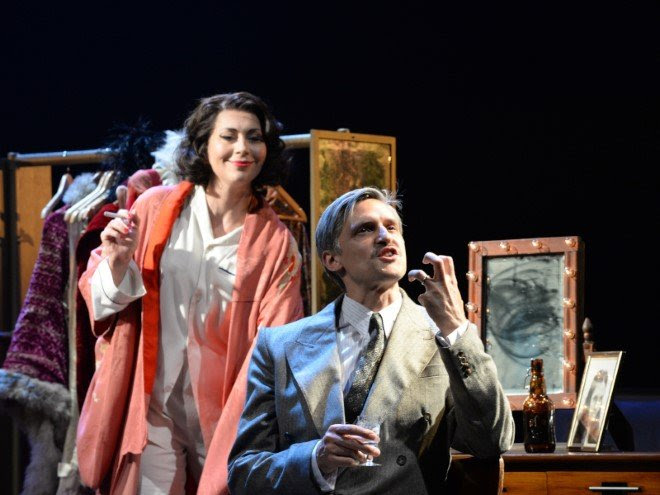
A Little Night Music, Opera North and Leeds Playhouse, Leeds Playhouse, until July 17. Box office: 0113 213 7700 or at leedsplayhouse.org.uk
THE collaboration between Opera North and Leeds Playhouse has finally resumed 13 months after originally intended. It has been a long wait but has picked up very fruitfully.
A bitter-sweet musical by the grand old man of bitter-sweet, Stephen Sondheim, is the perfect vehicle, reflecting on the fall-out from amatory accidents in European operetta just as we all contemplate a newly changed cultural scenario.
James Brining’s new production, updated to mid-20th century and hand in glove with Madeleine Boyd’s flexible set, is everywhere imaginative and often heart-warming, reaping the very best from a widely talented cast.
On the Playhouse’s apron stage – no proscenium arch (except briefly an improvised one for a Baroque throwback in The Glamorous Life – there is virtually no scenery. All is movable furniture: two clothes-rails, a grandfather clock, a doll’s house, a toiletry dresser, a double bed, a half-submerged piano. The only fixed point comes in Act 2, where the centrepiece is a fountain surmounted by a cherub, which is probably Eros.
James Holmes’s theatre orchestra – using the original and incomparable Jonathan Tunick orchestration – is placed at the back, stage right and blacked out for Act 2. Lighting designer Chris Davey’s discreet spots gently guide us to the next focal point, so that we are duped into feeling the action is continuous, the scene-changes happening magically.
Although much of the music moves in triple time, reflecting the triangular relationships of the story, its character evolves with the scenes. Holmes is masterful at these changing colours and accents, while remaining in close touch with his singers.
The Scandinavian twilight of Act 2, with alto flute, cor anglais, celesta and harp, is positively fragrant. He can equally easily find a lament in a waltz, as in Henrik’s Later, or pomposity in a polonaise, in the Count’s In Praise Of Women. His orchestra is the unsung hero of the evening.
There are some pretty splendid singers too. Heading the list has to be Josephine Barstow’s Madame Arnfeldt, the grande dame of the tale who has seen it all before, as she sardonically reminds us from her wheelchair in Liaisons. She exudes effortless authority through her commanding mezzo and diction that is a paragon of clarity.
As her actress daughter Desirée, Stephanie Corley brings a lovely soprano to her vacillating emotions; in Send In The Clowns, against a backdrop of slow choreography, her pacing and rubato is wondrous.
Opposite her – and incidentally rekindling their double act from Kiss Me, Kate with Opera North – is Quirijn de Lang as her erstwhile lover Fredrik, the lawyer caught in a mid-life crisis, whose firm baritone fires You Must Meet My Wife. His fall into the fountain is straight out of P G Wodehouse. Together their ambivalent emotions are cleverly cloaked.
Christopher Nairne brings an incisive baritone to his poker-faced Count, while Helen Évora’s Countess has charm to burn, notably in Every Day A Little Death. A word too for the Petra of Amy J. Payne, who brings both pizzazz and pathos to The Miller’s Son, a marvellous piece. Corinne Cowling’s Anne, Fredrik’s virginal second wife, and Laurence Kilsby’s high-strung Henrik merge neatly into elopement, while Agatha Meehan makes an engaging young daughter to Desirée (her alternate is Lucy Sherman).
The Quintet, five chorus members from Opera North acting like a Greek chorus, seem to me to sum up the whole show: they blend superbly, proving that good teamwork will always win the day. Congratulations to all, especially James Brining for pulling it all together.
Review by Martin Dreyer
